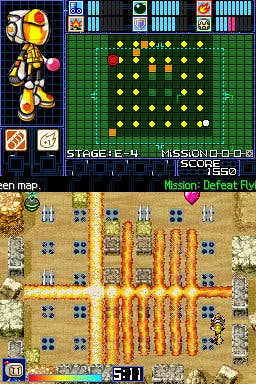Bomberman 2
Bang on.
There is a confession I have to make, and it's as well that I get it out of the way now. I suck. At Bomberman 2. I am endlessly found hanging around just inside the blast radius of my own bombs, joyfully entering cul-de-sacs in front of hungrier, more talented players and gleefully toddling over to poison skulls to savour their various debilitating flavours. I'll loiter quite blithely on floors flickering with the ominous orange of impending flames and stare, entranced, at the sparking laser warming up just in front of me. And this is just single-player - traditionally the relatively sedate and simple cousin of the main, multiplayer, event. The Stephen to multiplayer's Alec.
Starting up a multiplayer game is a whole other world of ownership, trounced regularly into last place against 'super easy' CPU opposition and the likes of the Eurogamer tech team. The tech team.
You know what? While I'm at it, I have another confession to make. I have very little patience. With almost everything but Bomberman 2.
Because, despite regularly watching my adorable avatar roasted cruelly inside his suit like a tiny, wide-eyed pig-in-a-blanket, the tide of verbal effluent that usually pours forth when I lose at stuff never transpires. There are no tantrums, nary a pout, snarl nor stamp of the foot. For me, and I would guess for a lot of regular gamers, this is pretty unusual.

Because, to a point, even losing at Bomberman 2 is actually pretty fun. Obviously, being handed your arse on a plate has its limitations as entertainment, but rarely do I find myself so eager to re-enter a fray which I fully acknowledge I have a very good chance of losing. That's not to say the game is particularly easy, because it's not - it's fair and consistent, but the later single-player stages are often bastard-tough. However, for someone without the dexterity and reaction time of a starfish on Valium, the basics are not a massive challenge.
Take the single-player campaign. Ignoring the bobbins plot about viruses and virtual bombermen, players are presented with a sequential mission selection, a path which branches later on and allows for back-tracking. Usually, each mission is formed of three sub-sections, which each consist of a separate goal. These are the pretty staple achievements of killing specified enemies, finding keys and hitting switches. Once each third is cleared, a door opens and players continue. At the end of the third stage is a 'warp gate' that clears the level.
The sub-sections are short, generally a screen or so each, and rarely take more than about 45 seconds to complete - handy when each level is on a three-minute time limit. Occasionally there'll be a stricter, sub-section-specific time-limit to beat as well. Every so often, at the fifth and tenth stages of each themed area, there'll be a special one-section puzzle or boss. Each theme adds a specific twist to arenas, such as bomb-magnets, conveyor belts and huge frickin' lasers.
However, the main evolution of the single-player mode is the addition of the RPG elements. Completing levels grants players experience points, accumulating toward experience levels that open up better equipment for use. This is where things get interesting/sacrilegious, depending on your viewpoint. Occasionally, during the due course of making things explode, parts pop up in arenas, in helmet, suit, glove and boot varieties. Collect these, and finish the level and they'll become available for the next mission. Each affects Bomberman's stats to varying degrees, according to their function, and can offer special skills when combined in sets.








